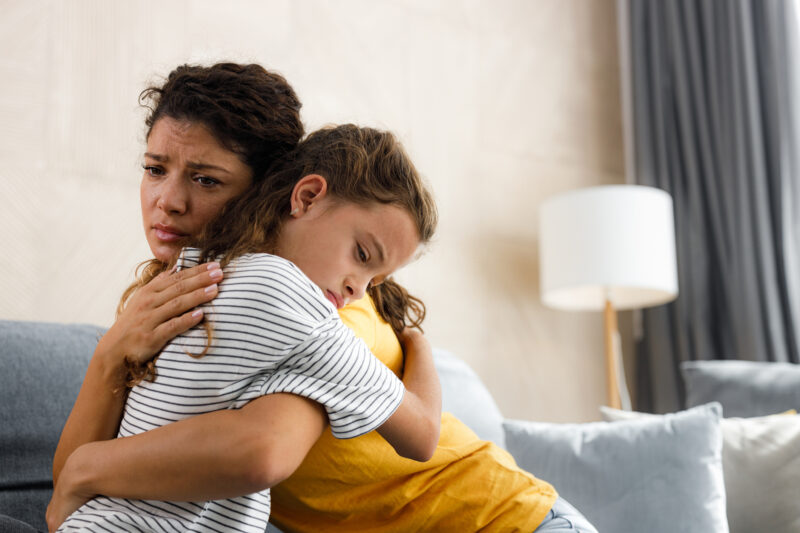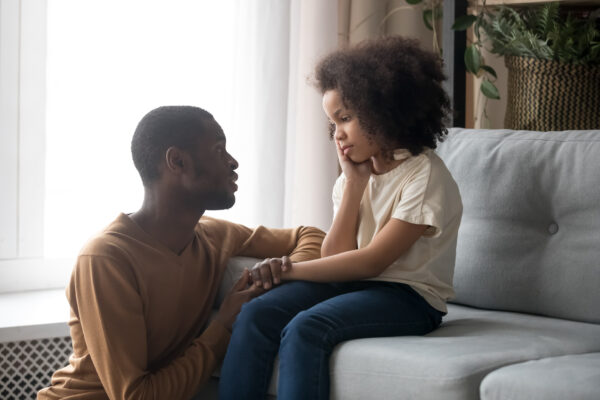 While death is a part of life, that doesn’t make it any easier to talk about. Death is a tragic event for both kids and adults alike. As parents, we naturally try to shield our children from the heartache and sadness by not talking about it. When in fact, avoiding the topic of what’s happened can make death scarier for kids and intensify their worries.
While death is a part of life, that doesn’t make it any easier to talk about. Death is a tragic event for both kids and adults alike. As parents, we naturally try to shield our children from the heartache and sadness by not talking about it. When in fact, avoiding the topic of what’s happened can make death scarier for kids and intensify their worries.
“When families lose a loved one, it’s important to discuss the death with kids to help calm their fears,” said Dr. Sarah Friebert, director of Akron Children’s Haslinger Family Pediatric Palliative Care Center. “Talking about it normalizes death and helps us understand their thoughts and feelings so we can better help them cope.”
She suggests starting off the conversation using simple words, being honest and following your child’s lead. Like adults, kids process grief in all different ways. You can gauge what your child can handle by giving information in small bits at a time.
Dr. Friebert and Akron Children’s Bereavement Coordinator Nancy Carst, LISW-S, offer tips for the best way to help your child cope.
Dos for helping kids deal with death
- Do talk to your children right away about what happened and what death means using words that are clear and direct, such as “dead” or “died.” In a calm setting and caring voice, you could say, “When people die, their bodies stop working. They don’t eat, sleep or breathe.”
- Do encourage your kids to ask questions and say what they’re feeling. It’s a good way to get a sense of what they’re thinking so you can better support them. You can label your own feelings to make it easier for kids to share theirs.
- Do tell your children what to expect. If the death of a loved one means changes in their routine, explain what will happen to help your kids prepare. Also, looking at it through your children’s eyes, prepare them for what they will see and do at the funeral, and follow up with their feelings and concerns afterwards. It’s important kids are given the option to attend wakes and funerals to grieve. You don’t want them to feel excluded, and it could prolong sad feelings or magnify fears.
- Do allow kids to join in rituals, such as funerals or memorial services. Younger kids could draw a picture for a loved one to show at the wake or help choose pictures to display. Older kids could sing or read a poem at the funeral service. Having a small, active role lets kids feel part of things and helps them cope.
- Do help your child remember the person. In the days and weeks ahead, encourage your children to draw pictures or write down stories of their loved one. Don’t avoid talking about the person who died. Sharing happy memories helps heal grief.

Encourage your kids to ask questions and say what they’re feeling. It can give you a sense of what they’re thinking so you can better support them.
Don’ts for helping kids deal with death
- Don’t use code words for death, such as “went to sleep,” “passed away” or “lost,” because they can be scary or confusing to kids. For example, if you say grandpa is sleeping, kids may not want to go to sleep because they are scared they won’t wake up again.
- Don’t hide your emotions from your child. It’s natural for parents to be upset after a loss. When kids see you cry, it models for them a normal and healthy way to grieve. If you hide your feelings, it sends the message that kids aren’t allowed to cry and can make them feel more alone because they don’t see others feeling the way they do.
- Don’t change your child’s daily routine. Kids thrive on consistency, especially in stressful situations. Try to keep their daily routines as much as possible, including participating in their usual school, social and sporting events.
- Don’t put a timetable on your child’s grief. Be prepared for your child’s grieving experience to be different from your own. Something may spark a difficult day for your child when you least expect it. Give your child extra time and comfort, and reassure her that things will get better.
There is no one way to feel and show grief. However, for children who have drastic behavioral changes, such as sudden aggressive behavior, loss of appetite, sleep disturbances or loss of interest in activities they once enjoyed, additional support may be necessary.
“Parents should be prepared for a wide range of behaviors from grieving children, and that’s normal,” said Nancy. “However, if there’s a prolonged period of extreme behaviors that are interfering with school and daily activities, parents should speak to their child’s pediatrician or seek out grief support from a mental health specialist for professional help.”
If your child is suffering through a loss, Akron Children’s offers family support and grieving services for kids. To learn more about our Good Mourning support group or to register, call 330-543-3343.










